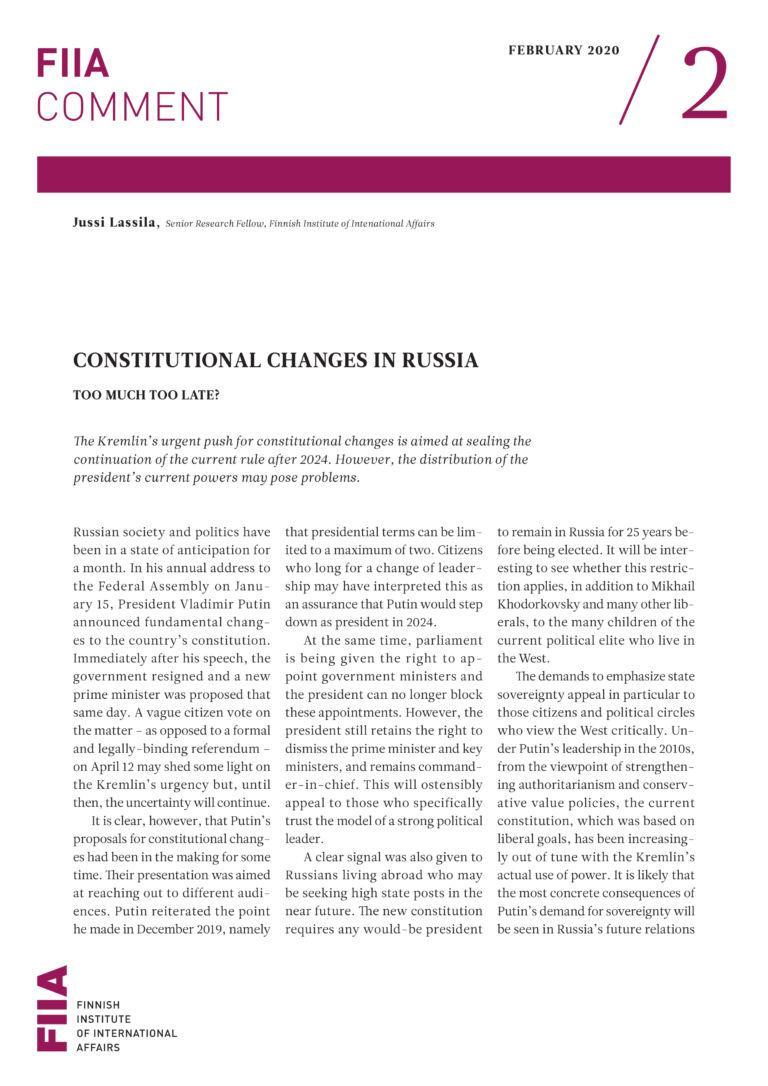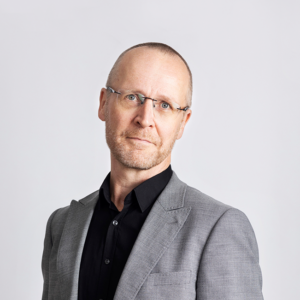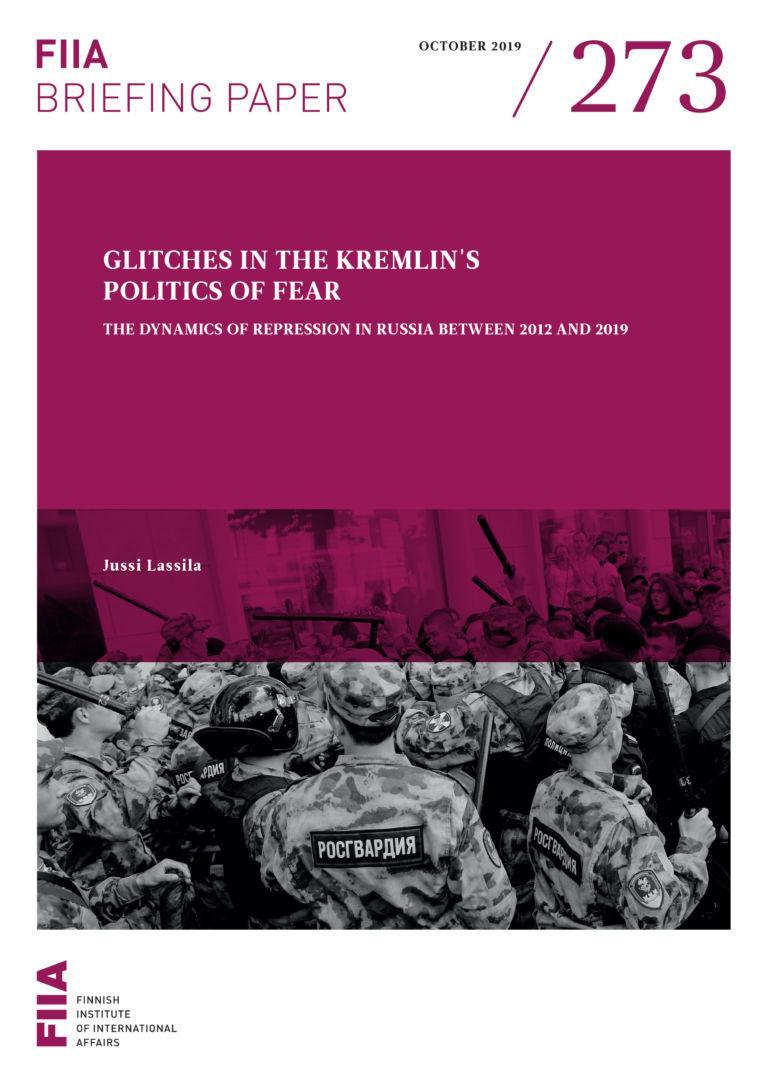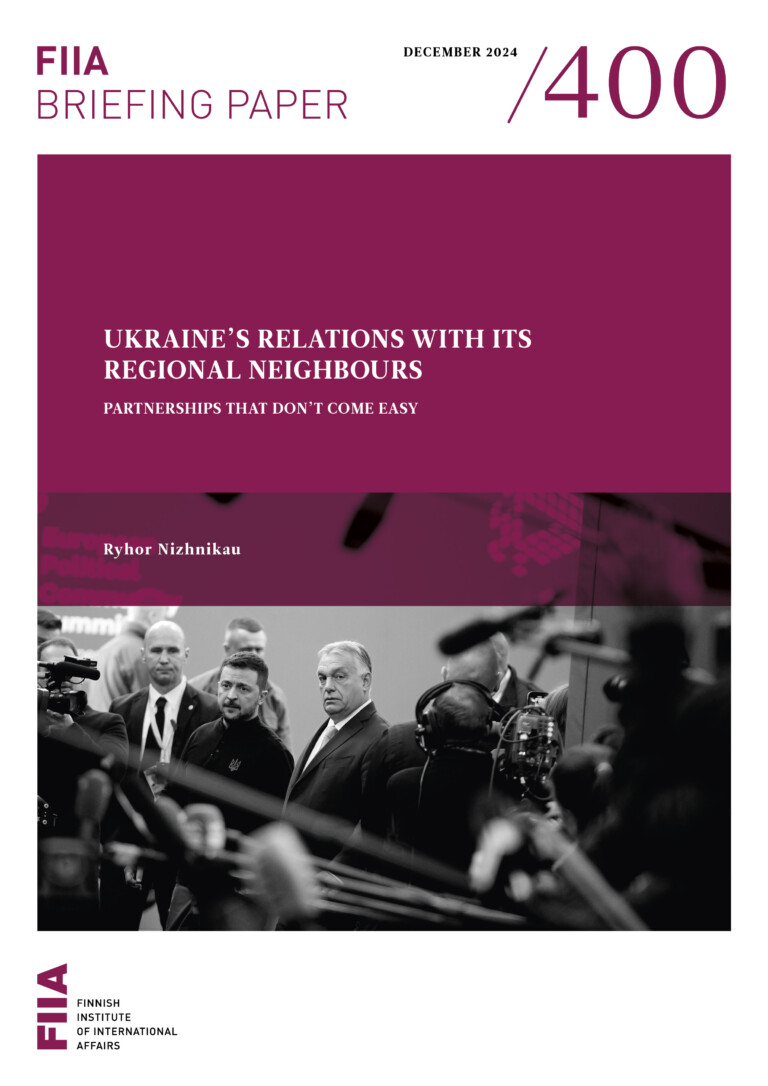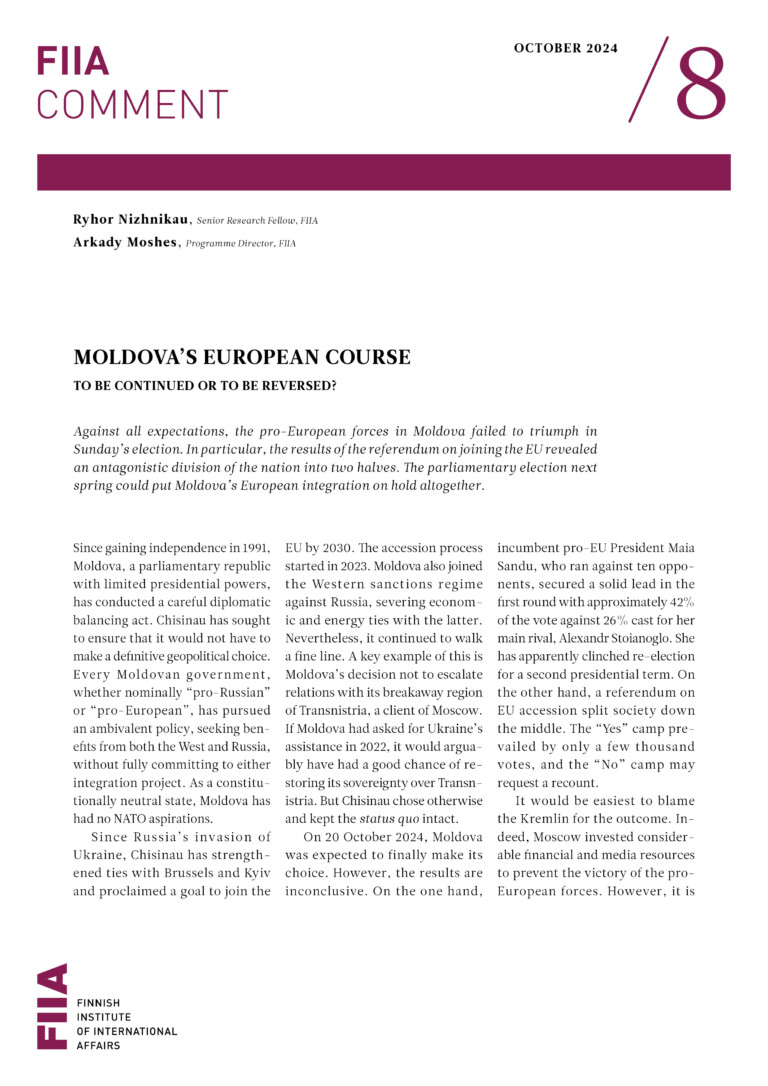The Kremlin’s urgent push for constitutional changes is aimed at sealing the continuation of the current rule after 2024. However, the distribution of the presidentʼs current powers may pose problems.
Russian society and politics have been in a state of anticipation for a month. In his annual address to the Federal Assembly on January 15, President Vladimir Putin announced fundamental changes to the country's constitution. Immediately after his speech, the government resigned and a new prime minister was proposed that same day. A vague citizen vote on the matter – as opposed to a formal and legally-binding referendum – on April 12 may shed some light on the Kremlinʼs urgency but, until then, the uncertainty will continue.
It is clear, however, that Putin's proposals for constitutional changes had been in the making for some time. Their presentation was aimed at reaching out to different audiences. Putin reiterated the point he made in December 2019, namely that presidential terms can be limited to a maximum of two. Citizens who long for a change of leadership may have interpreted this as an assurance that Putin would step down as president in 2024.
At the same time, parliament is being given the right to appoint government ministers and the president can no longer block these appointments. However, the president still retains the right to dismiss the prime minister and key ministers, and remains commander-in-chief. This will ostensibly appeal to those who specifically trust the model of a strong political leader.
A clear signal was also given to Russians living abroad who may be seeking high state posts in the near future. The new constitution requires any would-be president to remain in Russia for 25 years before being elected. It will be interesting to see whether this restriction applies, in addition to Mikhail Khodorkovsky and many other liberals, to the many children of the current political elite who live in the West.
The demands to emphasize state sovereignty appeal in particular to those citizens and political circles who view the West critically. Under Putinʼs leadership in the 2010s, from the viewpoint of strengthening authoritarianism and conservative value policies, the current constitution, which was based on liberal goals, has been increasingly out of tune with the Kremlinʼs actual use of power. It is likely that the most concrete consequences of Putinʼs demand for sovereignty will be seen in Russiaʼs future relations to international law: instead of the constitution being in line with international obligations (like the current constitution), in the new constitution these obligations will only be valid if compatible with Russian law.
Similarly, Putinʼs call for minimum wages and pension indexes to be inscribed in the constitution is a direct message to those suffering from poverty, whose numbers have increased in recent years. The immediate political objective of the message is likely to be related to the upcoming Duma elections, which will be held by September 2021 at the latest. This was concretized in the immediate resignation of the unpopular government.
However, from the perspective of Putinʼs authoritarian position and power, the most significant issue relates to his own position after 2024. Would we have seen the events of January 15 if the restriction on two consecutive presidential terms had been lifted earlier?
The current constitution has provided an excellent guarantee of Putinʼs presidential powers. Innumerable infringements of constitutionally guaranteed civil liberties by the Putin regime have violated the spirit of Boris Yeltsinʼs liberal constitution. However, the fundamental flaw in the 1993 constitution in this respect lies in the presidential prerogatives. It is the president who guarantees and defines civil liberties, as well as the policies and guidelines of other political institutions.
The flaw in the new constitution may lie in Putinʼs demand to continue the presidential-centred regime, echoing his views on the unsuitability of parliamentary rule for Russia. However, the current presidential powers will be shared in some way, perhaps not so much between parliament and the president, but with the president and a state body whose status will be confirmed in the new constitution. This state body is very likely to be the currently informal State Council, established by Putin in 2000, which has mainly been a prestigious discussion club. Putin would take over the leadership of the constitutionally reformed Council no later than 2024. Whatever this body will be, the issue is about distributing the presidentʼs current prerogatives in a way that will guarantee the current vertical exercise of power.
The closest parallel can be found in Kazakhstan, where the countryʼs long-term president, Nursultan Nazarbayev, made room for his successor, Kasym-Zhomart Tokayev, in 2019, moving to the leadership of the countryʼs influential Security Council. This transfer was also paved with speeches strengthening the role of parliament, even though Tokayev and Nazarbayev have the real power. However, a significant difference is that Nazarbayev made himself president for life as early as 2007 and, at 79, his resignation was due to his age. Putin has not seen the need to make himself president for life, but nor does his age seem to be a burden (he will be 72 in 2024).
A key challenge in implementing the new constitution may lie in coordinating power in a situation where society loses confidence in the government, the president, or both. In such a situation, how will the State Council coordinate an unpopular president and government if the Council does not have a direct right to appoint any of them? If, on the other hand, the president and government are made absolutely loyal to the State Council, the risk is one of uncertainty and slowness in decision-making. In the event of a crisis, there may be differences of interpretation regarding the prerogatives of the bodies. Although Putin himself has warned of the dangers of dual power, such a risk cannot be ruled out when the new constitution faces political reality.
